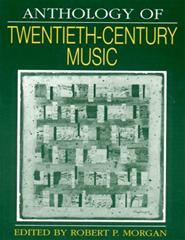
|
MUS 615-01 |

|
MUS 615-01 |
Instructor: Dr. Bruce H. Frazier, Coulter 254, 828-227-2400 (office), 227-2733 (studio)
Office hours: As posted, and by appointment
Email address: bfrazier@email.wcu.edu
Web address: http://paws.wcu.edu/bfrazier/
Link to WebCT: https://online2.wcu.edu/
FINAL EXAM (JURY)
TBD, Coulter 374
 |
Anthology: Many of the scores analyzed in our seminar sessions will be drawn from this resource. http://www.amazon.com/Anthology-Twentieth-Century-Norton-Introduction-History/dp/0393952843 |
Headphones:
Headphones may be needed for class sessions in the CO 374 lab. You will need to supply your own headphones.
Note: 1 1/4 inch connector (adapter) will be needed to connect to the mixer at the workstation. We recommend Audio Technical ATH-M2X "open ear" headphones.
Available in the bookstore or online at http://www.sweetwater.com/store/detail/ATHM2X/
Software Resources:
"Finale," music notation software from Coda Music Software.
"Pro Tools," digital audio recording and editing software from Avid/Digidesign
"Logic Audio ,"music sequencing software from Apple Computer
"Final Cut Pro " digital video production software from Apple Computer
Available for use in the Music Tech Classroom, CO 374, CAT Midi-B & F&PAC 248
Grading System:
|
|
|
|
|
|
Graded Elements:
|
|
|
|
|
Project Grading Rubric
|
|
|
|
|
|
| Effective, creative composition, appropriate use of instruments. Demonstrates a thorough knowledge of the techniques of composition and understanding of the software and tools involved in the process | Adequate composition. Demonstrates a basic knowledge of the techniques, tools and procedures. Some minor errors | Weak composition. Inappropriate scoring. Serious or persistent errors. | Unable to demonstrate the function of tools and proper procedures of scoring. | Failure to complete the project. |
Music Tech Classroom Hours (Coulter
374)
(Subject to change)
| Monday |
|
|
|
|
|
|
|
|
|
7:00-10:00 P |
|
|
|
|
Course Description and Schedule:
MUS 615 is a class in applied composition for graduate students who have had some prior experience as a composer. There will both group and individual instruction. The group will meet once a week in a 50 minute seminar (TBD). We will examine a notable work in the 20th-21st century repertoire (similar to the examples listed below) and play and discuss examples of works by the members of the group. In addition, a 25 minute individual lesson will be scheduled each week. In this session the student will present their work-in-progress on assigned pieces and other "personal" compositions based on their interests and abilities. The process is to consider the material that has been added for that week and suggest changes and strategies for the further development of the piece. These pieces will be recorded in the studio or in live performance and included in a portfolio for final presentation. There may be quizzes on the assigned material including listening presented in the seminar, but no formal examination will be given. The final exam time is reserved for presentation of final projects in a jury setting.
Some short "works for hire" will be assigned during the semester. These will be completed and prepared for broadcast for radio, TV, digital disc and/or the Web. These projects will include...
* Music for UNC-TV, dramatic underscore for the "UNC Service Award," an awards show which will air in October. This will be a group project that will be written, played and recorded by members of the class (with additional overdubs). Each student will compose about 2 minutes of music for the project.
* Music for a one- or two-minute video underscore for students in digital animation-motion graphics projects in ART 479 (with Mary Anna LaFratta), schedule TBD.
* Other projects as may be assigned.
Objectives:
1. To develop the various skills involved in creating a piece of music which is cohesive, purposeful and communicates to others.
2. To compose music as a "work for hire." To produce a well-crafted and well-performed composition written in an appropriate style that successfully meets the needs of a client.
3. To experience music and become familiar with composers and specific compositional techniques of the 20th-21st century. To investigate the music of the previous century in order to understand the changes that have occurred in compositional style and technique.
4. To harness the technological tools used in the compositional process including music notation software (Finale), applications for sequencing and digital audio recording and mixing (Logic or Pro Tools), and virtual instrument libraries as needed for the realization of musical ideas.
Analysis of notable 20th-21st century compositions:
Each student will prepare an analysis of several short compositions from the 20th-21st century and present them in the class seminar. The list below may be augmented by additional works of interest to the group. Most of these are included in the Morgan 20th Century Music Anthology, other scores and recordings will be provided as needed.
Claude Debussy: Estampes, No. 2 (La Soirée dans Grenade)
Alexander Skryabin: Piano Pieces; Prelude, Op. 35, No. 3 [1:03], Op. 56, No. 4, and Prelude, Op. 74, No. 3 [0:43
Bartók: from Mikrokosmos, Vol. VI;
- No. 148, Six Dances in Bulgarian Rhythm, No. 1 [1:50];
- No. 140, Free Variations [1:37];
- No. 144, Minor Seconds, Major Sevenths [3:56]
Arnold Schoenberg: Pierrot Lunaire (selected movements) (http://www.lunanova.org/pierrot/anim.html)
Paul Hindemith: Ludus tonalis; Second Interludium [1:26], Third Fuga [3:04]
Roger Sessions: from From My Diary; No. 2 [2:38] & No. 3 [1:46]
Henry Cowell: Piano Pieces; Aeolian Harp [3:45 ] & Fabric [1:26]
Oliver Messiaen: Liturgy of Crystal from Quartet for the End of Time [2:24]; Abyss of birds [7:40]
Milton Babbitt: Semi-Simple Variations [1:17]
Karlheinz Stockhausen: Kreuzspiel (first movement) [3:10] (http://www.stockhausen.org/)
George Crumb: Night of the Four Moons, No. 1, La luna está muerta, muerta... [2:29] (http://www.georgecrumb.net/)
Gunther Schuller: Seven Studies on Themes of Paul Klee; III, Little Blue Devil [3:22]
Steve Reich: Music for Pieces of Wood [14:23] (http://www.stevereich.com/)
Peter Maxwell Davies: Vesalii icones No. 1 [5:32], No. 6 [2:57], No. 8 [2:52], No. 14 [1:45] (http://www.maxopus.com/)
John Adams: A Short Ride in a Fast Machine, [4:40] (http://www.earbox.com/)
Morton Lauridsen: O magnum mysterium [5:50] (http://homepage.mac.com/kennesten/lauridsen/index2.html)
Jennifer Higdon: "blue cathedral" [ca 12:00] (http://jenniferhigdon.com/)
Portfolio:
Completed projects will be submitted as a portfolio of scores and recordings (audio or video) along with other information relevant to the compositions that might be included in a curriculum vitae such as descriptions, dates of performances, etc. The students are encouraged to present their works in recital and in the WCU Graduate Research Symposium (http://www.wcu.edu/1149.asp).
Accommodations for Students with Disabilities:
Western Carolina University is committed to providing equal educational opportunities for students with documented disabilities. Students who require disability services or reasonable accommodations must identify themselves as having a disability and provide current diagnostic documentation to Disability Services. All information is confidential. Please contact Disability Services for more information at (828) 227-2716, lalexis@wcu.edu or 144 Killian Annex.
Academic Honesty Policy:
Western Carolina University, a community of scholarship, is also a community of honor. Faculty, staff, administrators, and students work together to achieve the highest standards of honesty and integrity. Academic dishonesty is a serious offense at WCU because it threatens the quality of scholarship and defrauds those who depend on knowledge and integrity. Academic dishonesty includes the following:
A. Cheating. Intentionally using or attempting to use unauthorized materials, information, or study aids in any academic exercise.
B. Fabrication. Intentional falsification or invention of information or citation in an academic exercise.
C. Plagiarism. Intentionally or knowingly representing the words or ideas of someone else as one’s own in an academic exercise.
D. Facilitation of Academic Dishonesty. Intentionally or knowingly helping or attempting to help someone else to commit an act of academic dishonesty, such as knowingly allowing another to copy information during an examination or other academic exercise.
For specific information on procedures for cases involving allegations of academic dishonesty, see relevant sections in the Student Handbook.
SYLLABUS STATEMENT
I have read the syllabus for MUS 615 and am aware of the requirements and policies for this course.
Please print your complete name _____________________________________________ ID # ____________________
Sign ___________________________________________________________________ Date ____________________
Please return the signed form during the first week of class.